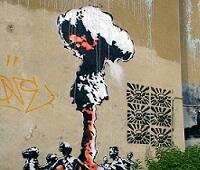Mutually Assured Destruction: Fifty Years and Counting
Issue:Global militarisation
Writing for the BBC, Tom de Castella explores the reasons why the fear of a nuclear exchange has receded in the public imagination. Marking the fiftieth anniversary of Robert McNamara’s speech to the American Bar Foundation that outlined the official US position on mutually assured destruction (MAD), de Castella talks to a number of experts about the continuing threat from nuclear stockpiles around the world.
Christopher Laucht from Leeds University reflects on the importance of the fact that under MAD (as opposed to a conventional war), the public had no control. "You were at the mercy of political decision makers. Apart from the fear that one side would do something stupid, there was also the fear of technology and the question of 'what if an accident happened?'."
Professor Paul Rogers from the University of Bradford notes that the most serious stand-off today is "the prospect of a nuclear exchange between India and Pakistan in which tens of millions would die."
The article notes that “the end of the Cold War hasn't removed the nuclear warheads. Relations between Russia and the West have deteriorated in recent years. China, whose nuclear programme is little understood in the West, is doubling its military spending. India and Pakistan remains a potential flashpoint. So why don't people fear nuclear war as they used to?”
The full article with some associated data is available here.
Image source: Leeks.
 Delicious
Delicious Digg
Digg StumbleUpon
StumbleUpon Reddit
Reddit
Posted on 16/02/12

Comments
Post new comment